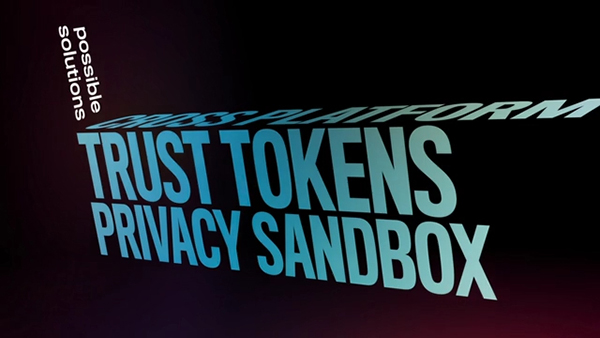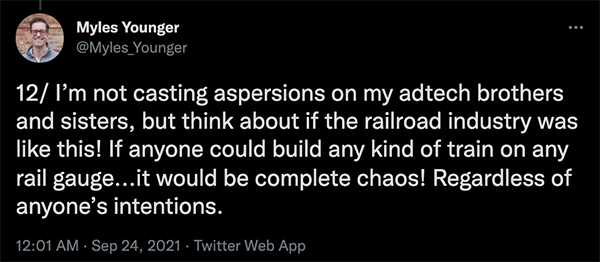 |
||||||||||||
|
||||||||||||
| Ad Land Gives Ad Tech’s Cookie Education the Funny Treatment |

|
| It’s hard for those of us in the ad tech industry to comprehend what’s happening with consistent changes involving cookies, UIDs, FLoC and the rest of that ilk, let alone everyone else! Privacy Sandbox? What’s that? Some ad tech and martech companies are poking fun at the industry and themselves by launching various ad campaigns that provide a laugh but also explain what they can offer as a brand. TripleLift launched a rap video that defines industry terms and acronyms like Privacy Sandbox, clean rooms, FLoC, and contextual targeting. Cheetah Digital created a brand campaign starring Wayne Knight, aka Newman from Seinfeld. Knight is a marketing manager following consumers online to predict their next move and send them targeted ads. Sound familiar? Project Liberty created an interactive installation in New York City where visitors could picture a world where they were in charge of their own data. |
| In this new world, publishers are still waiting to see what advertisers are doing while advertisers wait on the ad tech companies. “We believe that the third-party cookie — this creepy, snooping and tracking technology which has permeated the marketing landscape for the last decade — is the wrong way to activate and humanize communications or connections with consumers,” said Tim Glomb, VP of Content and Data at Cheetah Digital. “We believe [companies] should reach consumers through personalized, one-to-one communication.” In other words: We want to know everything about you, but not in a creepy way. Brand education campaigns like this are important. Most people have little to no knowledge about their first-party data, how they can control it and what companies usually do with said data. "For all of technology's benefits, the current tech structure lacks a conscience and that's creating and exacerbating major problems," said Frank McCourt, founder of Project Liberty. "Users of today's technology platforms do not own, control or derive value from their personal data and this should concern all of us.” Thanks for all the laughs guys. We enjoyed the ads. You really made our collective day. But the advertising ecosystem really needs some scalable cookie alternatives post haste. |
| Voila! WaPo’s Digital Ad Network Comes to Life |
| The Washington Post launched a digital ad network that was what? — two years in the making. Part of its Zeus ad technology business, Zeus Prime lets companies buy ads in real-time across different publishers. It's been two years since Zeus Prime first existed, but it was only available to a few D.C.-based advertisers that wanted to buy ads in the Post. “Zeus Technology serves over 125 publishing clients with products like Zeus Performance, a tool that makes publishers' ads load faster, Zeus Insights, a first-party data tool used for ad-targeting, and Zeus Video, a video ad sales tool.” Ads are $9 CPM or $10 CPM for an added layer of targeting, like reaching someone who works in finance. “These rates are higher than what you would typically find on a platform like Facebook or Google, but lower than what it would cost if an advertiser bought digital ads from a premium publisher directly.” In addition, Vox not too long ago launched their own digital ad network, even making their first-party data segments and brand-safety tools available across the network. |
| Surprised? Nah? We're not either. This is really no huge shock. We expected this latest move from WaPo for the past two years, ever since Zeus was first launched. If 2020 has taught us anything, alternative revenue streams lead by first-party data strategies are a must. And with that, a lot of pubs are diversifying and leaning heavily into self-service tech. “It’s just not cost-efficient to have a salesperson go through the traditional contract process for transactional or low-spend advertisers, so self-service tech is very appealing for not only capturing incremental revenue but also providing workflow efficiency.” Brands like Walmart, Amazon, Snapchat, TikTok, TripAdvisor, Hearst, Hulu, Soundcloud, and Spotify all use self-serve tech — and they're all seeing huge growth because of it. (For many, it was the only way to survive the Pandemic.) “As small, medium, and large businesses alike look for efficiencies and focus on investing in performance driving media, easy to use self-serve platforms, like Tripadvisor Media Manager, have become a critical part of the mix providing 24/7 access to our platform and performance dashboards to evolve campaign targeting, creative and budget in real-time,” said a TripAdvisor rep. “We believe publishers and brands must take control of their most valuable assets—data,” said Peo Persson, Co-Founder and CPO of DanAds. “With self-service, publishers take control of the essential part of the value chain— ad buyers. If we top that with a self-service platform, where the publisher gets full control and ownership of data related to every transaction, we believe the chance of surviving and even thriving in the future media landscape is much higher.” Ohhh, so many fiefdoms on the open web. |
| Amazon Follows Apple’s Lead And It’s Not Good for Advertisers |
| Apple has been restricting data as of late and Amazon looks to be following suit, by restricting data that comes from its owned and operated Connected TV (CTV) apps, IMDbTV and Twitch. The company hides IP addresses when sharing ad campaign data for both IMDbTV and Twitch. “Without the addresses, the effect could be similar to what advertisers have seen on Apple devices, where less consumer data means diminished capacity to collect advertising metrics, such as how often someone viewed an ad.” |
| “It could have a pretty wide impact,” says Tal Chalozin, chief technology officer at Innovid, a digital video ad tech platform. “If you’re a marketer looking to engage frequency capping, then you don’t know anything about the home, so it’s harder to do that. All parties are not getting as good of a result as they wanted. Marketers would like to see the data; tech providers rely on it to sell products; for media companies, it makes it harder for them to do targeting, they can’t release the most relevant ads.” It sounds like Amazon is playing dirty. Should this be something the FTC tracks in its antitrust proceedings? Just a few short months ago, we opined in this space that “if publishers can’t rely on cookies or IP addresses, how will they target anything? Now here's something else for the ad tech ecosystem to worry about, except this time it's not the open web or mobile, it's CTV. The depth and specificity of targeting will undoubtedly suffer, leading the entire ecosystem to get more creative when targeting consumers — and when measuring performance. Day by day it seems that there’s less for buyers or sellers to actually be able to control. |
| Around the Water Cooler |
|
Moving in a more privacy-centric direction, Big G is opting to stop relying on consumer's last interaction alone and instead employing ML and switching to data-driven attribution. Marketers have mixed emotions about this and many won't even ride the DDA wave. Like, is this new direction even really privacy-forward at all?
Charlie Warzel and his Galaxy Brain go deep into the advertising ecosystem weeds with Gizmodo's Shoshana Wodinksy to uncover the internet's original sin. Well, about time. Tech Lab has upgraded the content taxonomy to a new rev to updated Content Taxonomy 3.0 structure to support contextual buying for CTV/Video (and there's also something in there about expanding the news category.) There's a new set of categories and vectors to support buying on Podcasts, Games, and Mobile Apps as well. It will be open for public comment for 30 days, from September 23 to October 22. With the death of the third-party cookie upon us, contextual targeting is only growing. While it's a standard, it's still not standardization. But at least it offers everyone a place to start. And that's always better than nothing. |
 |
||||||||||||
|
||||||||||||
 |
||||||||||||
|
||||||||||||
 |
||||||||||||
|












